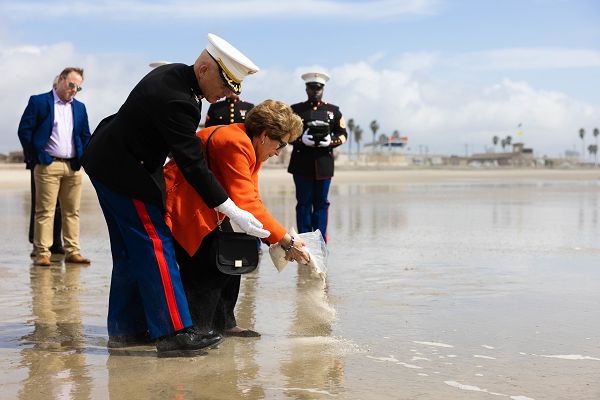
Camp Pendleton, California. (March 23, 2023): In this photo by Lance Corporal Juan Torres, Marisa Borzoni, the life partner of retired Marine Lt. Col. Clark Henry, spreads his ashes in the sea as part of his Memorial Services held here recently. Henry enlisted in the Corps during World War II, received a field commission during the Korean War, and received the Silver Star for his service in the Viet Nam War.
The ritual spreading of the ashes of the deceased dates to the ancient Greeks who customarily scattered a small amount of the cremated remains across the ground as a memorial service to the departed.
The Hindus, who have a long and honored tradition of scattering the ashes of loved ones, believe one’s salvation (nirvana) is achieved when their ashes are spread into the sacred river Ganges.
Some Christian communities connect scattering ashes with Genesis 3:19 which holds that "for dust you are, and to dust you will return."
Americans are familiar with the tributes to the fallen performed each Memorial Day, but other nations have their own practices and customs when it comes to honoring their war dead. In France, Armistice Day is observed with a moment of silence at 11 a.m. on the 11th day of the 11th month — Nov. 11, which is Veterans Day in the United States.
The day is full of ceremonies, special church services, and everything is adorned with poppy flowers. The holiday originally commemorated the 1.4 million people killed during World War I but has come to include all French citizens lost to armed conflict.
The English celebrate Remembrance Day, often called Poppy Day, also on November 11th. Since 1919, England has commemorated those lost during the First World War by wearing the poppy flower which became an emblem of remembrance as they bloomed across battlefields. Their bright red color came to symbolize the blood spilled during the war and inspired the famous poem, “In Flanders Fields,” a tune that has become synonymous with the poppy and England’s memorial ceremonies.
Finally, the Dutch observe “ DOW enherdenking,” which translates to “remembrance of the dead” on May 4th. At exactly 8 p.m., two minutes of silence are observed throughout the Netherlands while all public transport is halted, and radio and televisions go silent.
No matter the language, these sad farewells allow citizens to honor their war dead with the dignity they deserve.


